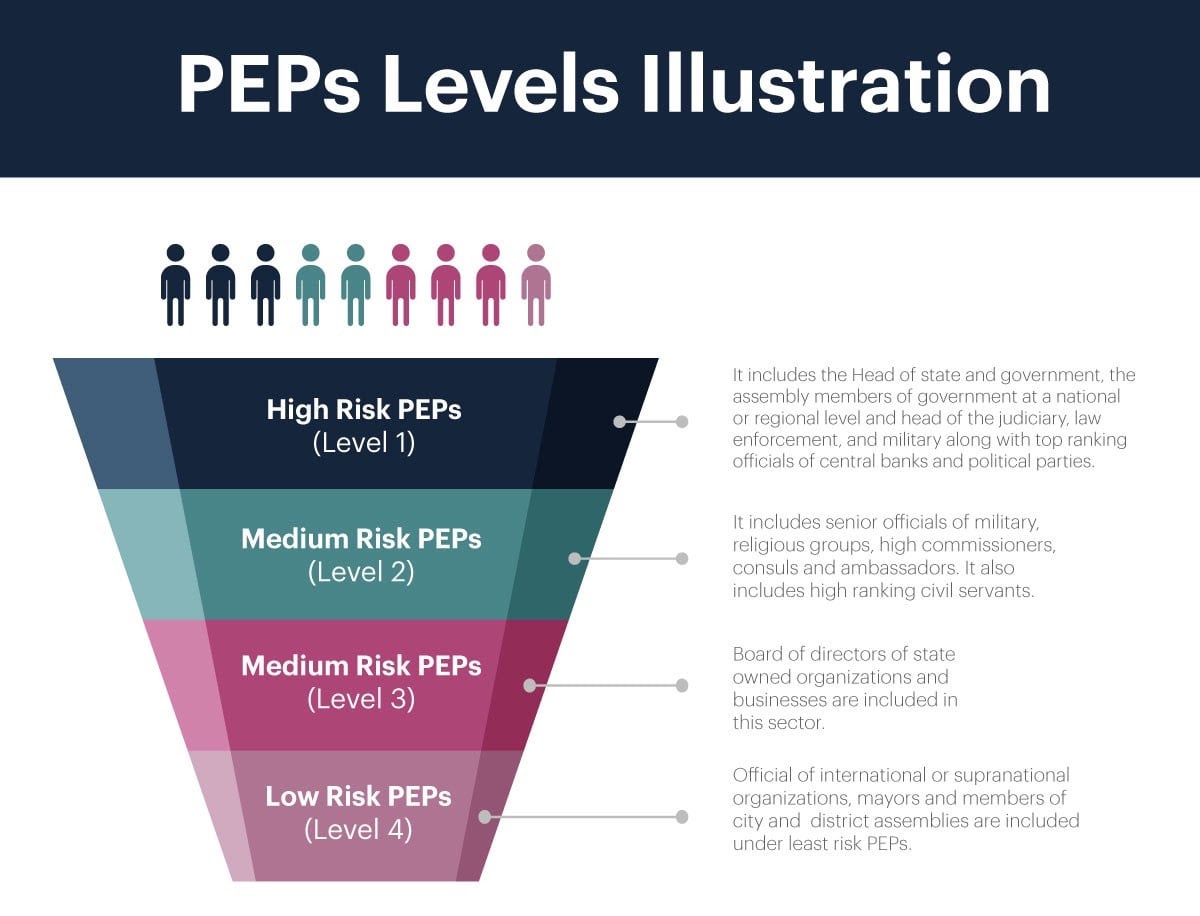Politically Exposed Person – An unsaid threat to Businesses

A politically exposed person or PEP is the one who has been assigned to perform prominent public functions or the one who has a high profile role in society. Due to their position, they can commit money laundering offences and other related corrupt activities like terrorist financing. This thing has already been confirmed by many case studies and analysis reports. There is a proper list available that has all names of PEPs known as the PEP list. Such people are a high risk for the financial sector as they are more likely to become involved in financial crimes like money laundering and financing of terrorists than other people. PEP status highlights additional risk involved, so businesses must apply additional AML/CFT measures when establishing a business relationship with these persons.
PEP status does not predict criminal behaviour but signals the businesses to be more vigilant. Businesses must conduct proper monitoring to ensure that they do not miss a change in PEP’s risk profile. PEP monitoring requirements are not indicative of criminal behaviour but are just preventive in nature. The evident potential risk factors associated with PEPs justify the application of additional preventive measures when it comes to establishing business relationships with PEPs. In order to avoid reputational and regulatory damages, organizations should understand how to recognize a politically exposed person (PEP) and their associates.
Defining Politically Exposed Persons
This term first emerged as “Senior Foreign Political Figure ” in the wake of an Abacha Affair which was a money-laundering scandal in Nigeria, this case jolted global efforts to secure the abuse of financial institutes by the public figures.
PEP, according to FATF Recommendation is defined as following
“Individuals who are or have been entrusted with prominent public functions in a foreign country, for example, Heads of State or of government, senior politicians, senior government, judicial or military officials, senior executives of state-owned corporations, important political party officials.”
According to EU Third Anti-Money Laundering Directive:
“Natural persons who are or have been entrusted with prominent political functions and immediate family members or persons known to be close associates of such persons.”
Three Major Types of PEPs:
The AML and CFT Act identifies three major types of PEPs which are as follows:
Domestic PEP
A person who has a prominent public position or has a role in a government body.
Foreign PEP
Someone who holds a prominent public position or a role in some other country is considered as a foreign PEP.
International organisation PEP
A person who has a high position in an international organisation, such as the United Nations (UN), the World Trade Organisation (WTO) or the North Atlantic Treaty Organisation (NATO).
List of PEPs- A Detailed Insight:
Financial institutions and businesses can categorize PEPs as:
Government Officials
Current or former government officials that are in domestic or foreign government positions including heads of states, individuals working in executive, administrative, legislative, military or judicial institutes in various elected or unelected roles.
Political Party Officials
Officials that are appointed to senior positions in major political parties at home or in foreign countries.
Senior Executive:
Individuals who are serving in senior executive roles, for instance, directors or board members in government owned or foreign organizations.
Family Members
Family member, the immediate one, of a political or government official, or of a senior executive. For instance, spouse, parents, children, siblings, or spouses’ parents or siblings.
Categories of PEP

The Subjective Nature of PEPs:
To define politically exposed persons there is no single international standard so far. Subjective judgment has to be made in order to decide if an individual is politically exposed by taking into account the associated risks. These may be influenced by their seniority and time spent out of the office if they were ever in an eligible PEP position. In the same way, there is no defined objective on whether an individual qualifies as a family or a close associate.
FATF Recommendations for PEPs:
There are confirmed risks associated with PEPs that justify stringent measures to be taken to put a halt on financial crimes such as money laundering, terrorist financing, and others. Businesses are required to take preventive measures before establishing a relationship with such persons. Businesses to perform a proper PEP list screening whenever a new customer is onboarded to check the criminal history and associated risks. FATF requires countries to ensure that financial institutions implement measures to prevent the money laundering through financial institutes by PEPs and to detect potential misuse whenever it occurs. The requirements are preventive and to be on the safe side. Moreover, businesses cannot refuse business relationships with PEP just because the client is in a PEP list. FATF measures extend on a broader spectrum to fight against financial crimes such as money laundering and not to put PEPs behind bars.
Identification of PEPs:
To comply with AML regulations and to trace and tackle PEPs, businesses need to have a proper procedure in place. Any business entity should know when to check for a PEP and why to check for it. PEP record should be integrated in the system of every business so that the onboarding customer is screened against it and to nullify the associated risks and criminal activities. In this regard, strict Customer Due Diligence along with PEP screening must be performed before establishing a business relationship with any customer.

 Explore Now
Explore Now













